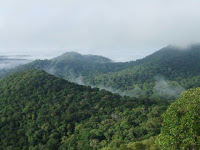A focus on policies to conserve tropical forests for their carbon storage value may imperil some of the world’s most biologically rich tropical forests, says new research.
Many countries have climate-protection policies designed to conserve tropical forests to keep their carbon locked up in trees. But the new study suggests these policies could miss some of the most diverse forests because there is no clear connection between the number of tree species in a forest and how much carbon that forest stores.
Lead author Dr Martin Sullivan, from the School of Geography at the University of Leeds, said: "International programs often encourage the conservation of forests with high carbon stocks, because their focus is to try to slow climate change. Until now, we didn't know whether these programs would also automatically protect the most biodiverse forests. It turns out they probably won't."
A team of scientists from 22 countries measured both tree diversity and the amount of carbon stored in 360 locations across the lowland rainforests of the Amazon, Africa and Asia. In each plot the carbon stored was calculated using the diameter and identity of every tree within a given hectare (2.5 acres). In total 200,000 trees were measured in the study.
The results, published in Scientific Reports, show that African tropical forests, spanning the Congo and West Africa store high levels of carbon, but are the least species rich. Forests in the Amazon and Asia, mostly in Borneo, have the greatest diversity of tree species, yet the Amazon tends to store less carbon per hectare than forests in Africa and Asia.
Co-author, Dr Joey Talbot, also from the University of Leeds, explained: "In many ecosystems, sites with more species tend to lock up more carbon. But this doesn't work for tropical forests. Most tropical forests already have many species, and it may be that beyond a certain point adding even more species makes no difference to carbon stocks."
The study examined remaining intact tropical forests, the most biologically diverse ecosystems on the planet, home to half of all species. These forests also play a critical role in the global carbon cycle, storing 250 billion tonnes of carbon. Protecting them is essential -both to secure a future for millions of species, and to meet the global commitment of keeping temperature increases well below 2 degrees C.
Although biodiversity did not boost carbon storage, it could still be important in the long run.
Read more at Climate Policies Alone Will Not Save Earth's Most Diverse Tropical Forests

No comments:
Post a Comment